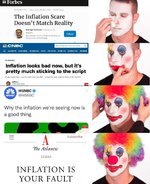Wow. That's actually an article on The Atlantic. Inflation is your fault.
I'll ignore the fact that "buying things" doesn't cause inflation, and just point out that even her weird theory doesn't make sense. She is claiming that people deserve high inflation because they "won't stop buying things", giving proof like:
Online shopping jumped 7.8 percent over the Thanksgiving
long weekend, more than analysts had anticipated.
Well, toots, did you measure this increase in
dollars or numbers of presents? Because what's happening is people are buying the same, or even fewer presents, (because they are poor), but because of price inflation the PRICE IN DOLLARS of those purchases is 7.8% higher than it was last year.
That's because the money supply has been inflated by about 1/3 since covid. And inflation, according to shadowstats, was 9% (officially) or 17+% if they measured it the 1990 way, without the fake price substition nonsense.
So yeah, if we were buying the same things as before, our expenses would be up 17%, not 7.8. In other words, we HAVE cut back our spending, because we all feel poorer.
So she goes around measuring everything in price, not quantity, and pretends that people are spending more.
That's like saying "Why did you increase your spending to $6 a week on eggs when last year you spent $3"?
Because the price of eggs doubled! You're still buying the same 12 eggs every week. There is no "increase in egg buying"!
People hate inflation, just not enough to spend less:
Huh? Please. Enlighten me. How does one spend less when there is inflation? By not having Christmas?
My heating bill is $100 more than it's ever been. Should I just shiver or wear a giant coat when I sleep?
I'm still heating the same house with the same amount of gas as always (more or less), but the price is up almost 40%.
But I'm not "increasing my use of gas by 40%." I'm probably using less, setting the thermostat down because its so darn expensive, while still getting a higher bill.
The reality is, when you look across the board at cars, food, energy, clothing, etc.
the sales of all these things are DOWN. Which means we are cutting back due to inflation. It also means we are in recession. But if they ignore the production numbers and just measure everything by its price they can pretend sales of everything is increasing because its price is so high. it's like telling the Weimer grandmother "Why are you spending a wheelbarrow full of money on bread! You should cut back! Don't you know we are having inflation?"
The problem is I think some of these Keynesian economists actually take articles like this seriously.


